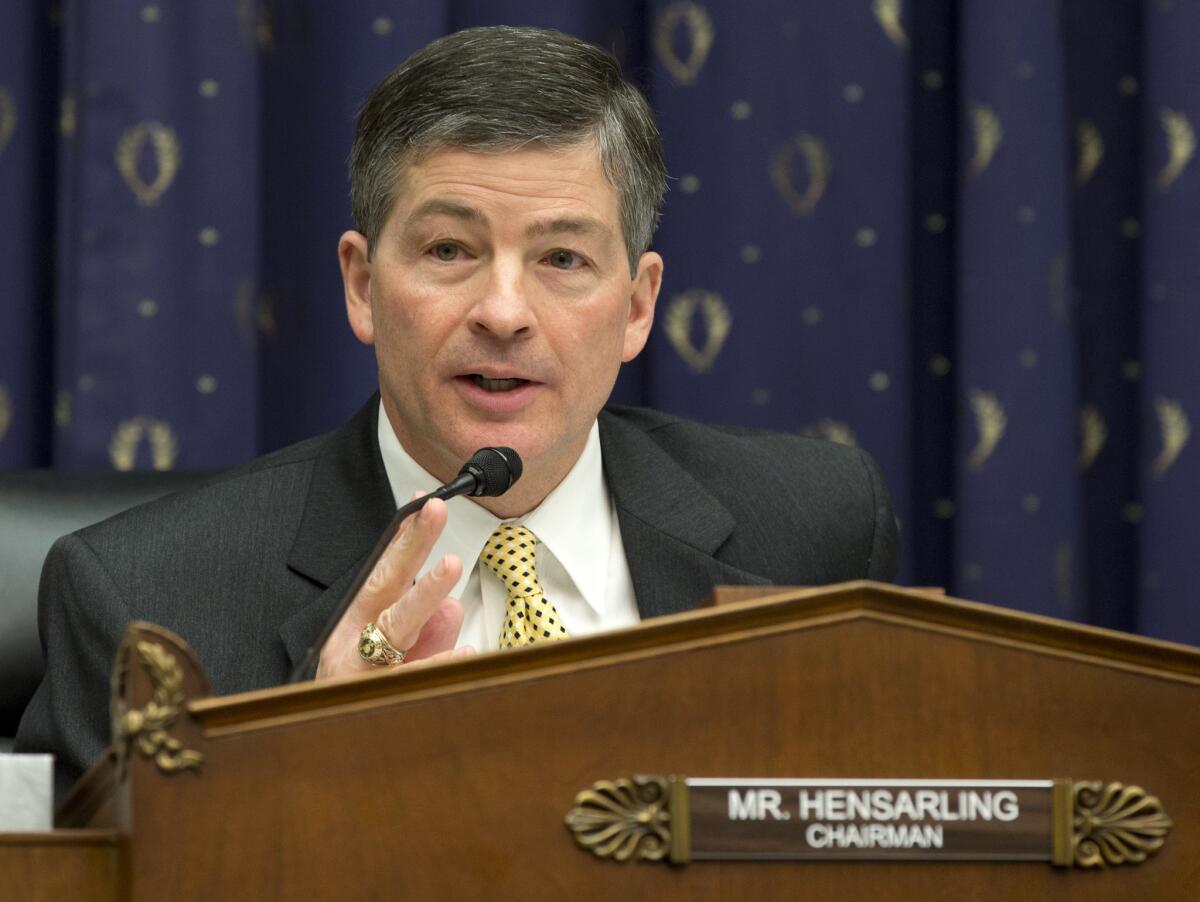Key House Republican unveils plan to overhaul Dodd-Frank financial reform law

- Share via
A top House Republican on Tuesday unveiled a sweeping plan to replace the Dodd-Frank financial reform law, which has been fiercely criticized as overly burdensome by GOP lawmakers, Wall Street executives and industry officials.
Rep. Jeb Hensarling (R-Texas), chairman of the House Financial Services Committee, called the 2010 law “a grave mistake foisted upon the American people” as he laid out the alternative that Republicans could seek if they win the White House in November.
He outlined a plan that would repeal or loosen a slew of new Dodd-Frank regulations in order “to offer all Americans opportunities to raise their standards of living and achieve financial independence.”
Key provisions would reduce the power of the new Consumer Financial Protection Bureau and allow banks to increase the amount of capital they hold to avoid stricter regulatory oversight.
“Simply put, Dodd-Frank has failed,” Hensarling said in a speech to the Economic Club of New York. “It’s time for a new legislative paradigm in banking and capital markets.”
The complex new legislation has virtually no chance of passing Congress this year. And President Obama would almost certainly veto any bill rolling back Dodd-Frank, which is one of his signature accomplishments.
SIGN UP for the free California Inc. business newsletter »
Obama last week criticized continued Republican attempts targeting the law.
“How it is that somebody could propose that we weaken regulations on Wall Street?” Obama said in a speech in Indiana. “Because of their reckless behavior, you got hurt.”
But Hensarling’s plan is a road map of what Republicans could try to accomplish on financial regulation if the party wins the presidency and retains control of Congress in the November elections.
Donald Trump, the presumptive Republican presidential nominee, said last month that he was drawing up plans that would “be close to dismantling Dodd-Frank.”
“Dodd-Frank has made it impossible for bankers to function,” Trump told Reuters. “It makes it very hard for bankers to loan money for people to create jobs, for people with businesses to create jobs. And that has to stop.”
Dodd-Frank passed Congress with almost no Republican support in the wake of the 2008 financial crisis.
The law toughened regulations on banks and other financial firms, set up a powerful panel of regulators to watch for signs of instability and created a new consumer bureau, which has broad authority to oversee credit cards, mortgages and other financial products.
Republicans have been trying unsuccessfully to scale back the law since taking control of the House in 2011.
Hensarling’s Financial CHOICE Act, which stands for Creating Hope and Opportunity for Investors, Consumers and Entrepreneurs, incorporates several bills that have passed the House but failed to become law with Obama in the White House.
Hensarling said Tuesday that the crisis wasn’t caused by lack of regulation but by “dumb regulation.”
“When they voted for it, supporters of Dodd-Frank told us it would ‘promote financial stability,’ ‘end too big to fail,’ and ‘lift the economy.’ None of this has come to pass,” he said.
Hensarling said his plan would address all those problems.
Banks could avoid tougher regulatory oversight if they held capital that was at least 10% of their assets. The current requirement is 3% for most banks and 6% for institutions considered systemically important.
Hensarling stressed the plan, unlike some other proposals, doesn’t force any bank to raise capital. But if they choose to, banks would be safer and avoid “Dodd-Frank’s suffocating regulatory complexity and control.”
To end the problem of financial institutions considered too big to fail, Hensarling would create a new section of the bankruptcy code to wind them down.
That would replace Dodd-Frank’s orderly liquidation authority, which allows regulators to seize and shut down a major financial firm on the brink of failure. Republicans have criticized that power as a type of bailout.
Hensarling also targeted the new consumer bureau, which he and other Republicans have criticized as too powerful and unaccountable to Congress because its funding comes directly from the Federal Reserve.
The plan would rename the agency the Consumer Financial Opportunity Commission. The single director would be replaced with a bipartisan, five-member commission and the agency’s funding would be subject to congressional appropriations.
Consumer groups, which strongly support the bureau, have said such changes would weaken its authority and allow Republicans to starve it of funding.
Hensarling also would take away the authority of the Financial Stability Oversight Council, a panel of regulators created by Dodd-Frank, to designate any firms as systemically important. The designation subjects the firms to stricter regulatory oversight.
And his plan would repeal the Volcker Rule, which prohibits banks from trading for their own profit and limits their ownership of risky investments.
MORE BUSINESS NEWS
Gannett persists in bid for Tribune Publishing
Verizon to bid $3 billion for Yahoo’s core business, report says
Sumner Redstone’s firm changes Viacom’s bylaws, creating a big hurdle for Paramount sale
More to Read
Inside the business of entertainment
The Wide Shot brings you news, analysis and insights on everything from streaming wars to production — and what it all means for the future.
You may occasionally receive promotional content from the Los Angeles Times.











